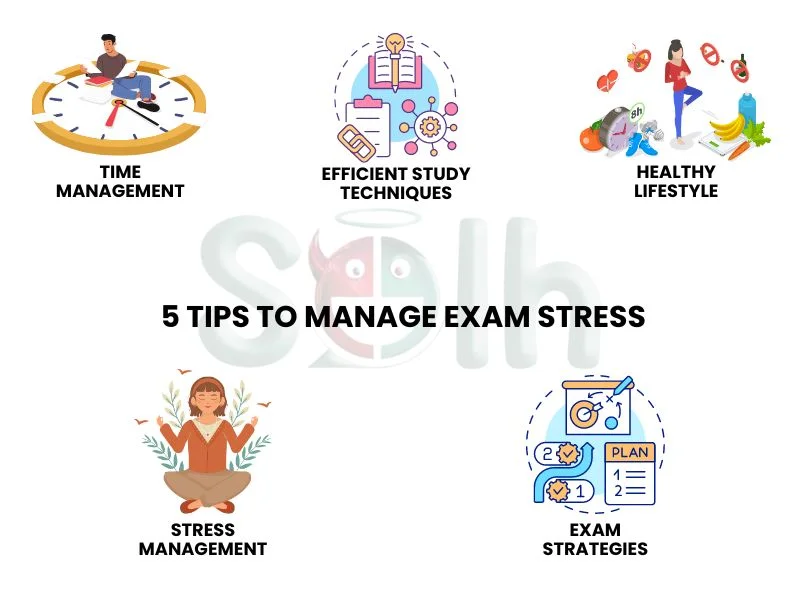Union Public Services Commission (UPSC) is often regarded as one of the most prestigious exams conducted in the world and the most difficult exam in India. Undoubtedly, this calls for a rigorous Plan of Action for preparation.
So, if you are a UPSC Aspirant, you're no stranger to Stress. Before moving ahead, let's understand what this word means.
Easily put, Stress is a state of worry or mental tension caused by a difficult situation. The American Psychological Association (APA) defines Stress as a physiological or psychological response to internal or external stressors.
It can be a feeling of emotional strain and pressure or a state of altered homeostasis. Stress can be caused by any event or thought that makes you feel frustrated, angry, or nervous, and it can affect nearly every system of the body. Hans Selye (1976) gave the concept of Eustress and Distress.
Eustress is the "good stress," the Stress you might feel before performing on stage, starting a new job, or getting jittery or butterflies in your stomach before checking your exam results.
Distress, on the other hand, feels unpleasant, can decrease performance, and can potentially lead to physical and mental health challenges. Our general concern in our daily lives is to prevent being distressed.
How can we do this really (without compromising on our preparations and exams)?
This blog unveils the strategies you can incorporate into your schedule to prevent being overwhelmed by stress without compromising on your preparation schedule for this esteemed exam.
Practical Tips to Deal with Stress
By incorporating a combination of time management and healthy lifestyle strategies, you can navigate stress in your daily life. Here are the tips you can try applying for managing things:
Time Management
- Try to allocate specific time slots for each subject on your list of studies. Try to stick to your schedule and keep in mind that you should make your schedule achievable.
- Focus on tasks that have a higher priority or that you find challenging.
- Divide your study portion into chunks or smaller sets to achieve your goals.
Efficient Study Techniques
- Try to understand your learning style and accordingly approach the material, eg. get your hands on activities like watching videos and writing the material.
- Try to understand your focus periods. A focus period is the time span in which you can sit and retain stuff. On average, the focus period for an individual is 30-45 min. You can note this period and make your schedule accordingly.
- Regularly engage in practice exams to understand your preparation level and make changes to your plan to fit the challenges faced.
- Review your course material to facilitate long-term learning.
Healthy Lifestyle
- It is very important to have a balanced diet. That is because it added to a potential better mental healh. Eg. omega 3 added to the diet improves cognitive functions.
- Exercise regularly as it helps you reset your day and reduces cortisol levels that are already on a high due to exams.
- Ensure that you sleep properly, as this is the period your brain works on consolidating the information learned. During sleep, the brain gets involved in the activity of making memories, which allows the brain to store the information learned throughout the day.
Stress Management
- Most important of all, practice MINDFULNESS. This helps you stay focused and get by each day progressively and in a healthy manner. You can also engage in activities like meditation to increase your attention span.
- Try to take short breaks between your study sessions to help you stay on track and not experience any burnout.
- If you find it difficult to deal with your emotions or are experiencing extreme Stress, seek support from your friends, family, or a counselor if needed.
Exam Strategies
- Familiarize yourself with the exam pattern and have a good time learning about the wants and needs of the exam.
- Allocate time to each section of the exam considering your capabilities and understanding of the required subject to be studied.
- Practice and learn relaxation techniques to manage exam anxiety as well as stay focused during the tests.

Consistency and Adaptability in IAS Preparation
Following your own daily schedule is one of the basic mantras to be followed after joining coaching classes. Creating a study routine puts you on the path to learning and acquiring more with each passing day.
However, it is equally crucial to remain flexible and prepared for what happens along the way, which can throw you off- unexpected exam pattern change, personal barriers, or new study material.
It is this dual approach of consistency and adaptability that will allow you to make sure not too much short-term pressure distracts your preparation but still be lifted up in situations where new challenges materialize.
It is not as easy as just sitting down and studying with your study schedule; if you encounter a topic that is more difficult, then adjust it to add some extra time for this. If there is a new hack or study tool, be open-minded to try it and make the most out of it in your schedule.
This balanced strategy will enable a supportable pace and help you in succeeding the IAS EXAM.
Staying on top of your exams and taking care of yourself are keys to balancing mental health while at school. Having a consistent schedule, getting enough rest, and eating well are all important things that will help you handle the stress of studying without giving up your health.
In addition, staying in contact with those who will be encouraging as you traverse the journey, setting practical goals, and ensuring that regular "breaks" are taken.
Remember, you should reach out for help when necessary, and becoming engaged in an activity that provides enjoyment can really go a long way towards improving your stress-handling capabilities.
Curriculum maintenance and a prudent method of self-care ultimately result in improved academic performance as well as a healthy, balanced future lifestyle.
Solh understands. We offer a variety of features to help you invest in self-care.
Journaling for Self-Reflection: Sometimes, not being able to care for yourself can come from a lack of self-understanding. Solh's journaling feature allows you to explore your thoughts and feelings in a safe space. By reflecting on your experiences and desires, you can gain clarity on what is stopping you from self-care.
Anonymous Support Groups: You are not alone. Solh's anonymous support groups connect you with others who understand the struggle. Share your experiences, find comfort in solidarity, and discover new perspectives on overcoming the hurdle to indulge in self-care.
Solh Buddy: Feeling lost or disconnected? Your Solh Buddy, a personalized virtual companion, is here to provide encouragement and support along the way. It can offer prompts, celebrate your victories, and remind you of your strengths as you navigate the journey towards self-care.
Talk now: Sometimes self-care can make you feel overwhelmed. Solh's talk now feature gives you access to dedicated counselors to help you navigate such situations.
Solh believes in a unique approach to introducing self-care. We empower you to take charge of your well-being by offering a variety of tools. Explore Solh App today and discover the power of self-reflection, connection, and support in overcoming any problem of the mind. You are not alone on this path.








